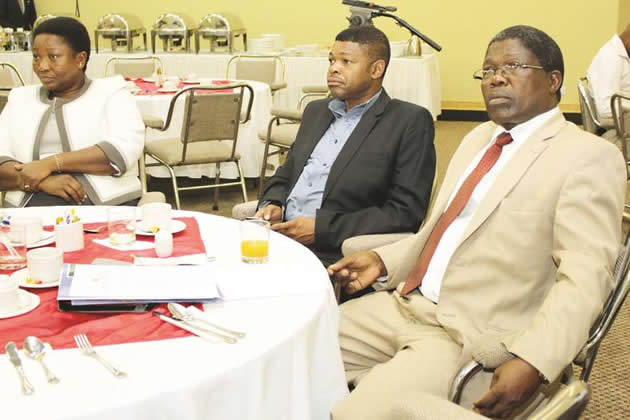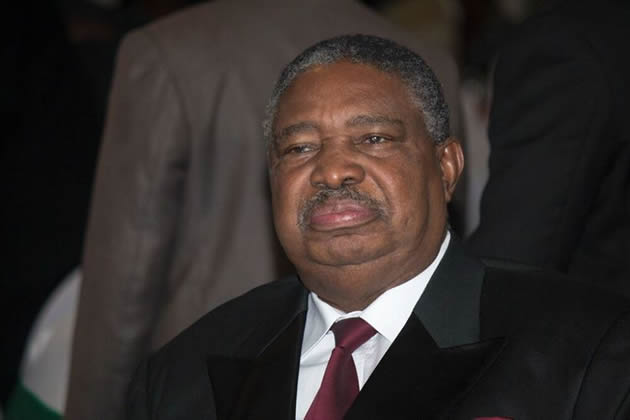BCC avails business stands


Bulawayo City Council directors, from left, Dr Zanele Hwalima, Engineer Simela Dube and Isaiah Magagula follow proceedings during a breakfast meeting with business leaders at a city hotel on Tuesday
Senior Business Reporter
THE Bulawayo City Council (BCC) has availed industrial and commercial stands for new business in different sectors of the economy in a bid to boost the city’s economy. The council’s acting economic development officer Brian Hlongwane told captains of industry at a breakfast consultative meeting on Tuesday that the city was full of investment opportunities.
“The city has investment opportunities which we’ve categorised into hospitality, house delivery, commercial and industrial where stands for such businesses have been availed,” he said.
Hlongwane could not disclose the number of stands but said Bulawayo had vast tracts of land for the development of modern hotels as well as revamping existing facilities that provide a natural environment in the city.
He said the city has five hectares of land at the intersection of Bulawayo drive and Harare Road, for instance, which is suitable for the development of a motel.
Hlongwane said the local authority was soliciting for investors to build a motel at the site.
At Umguza Nature Park, Hlongwane said, 401,2636ha were available while 2,030,75ha were also available at Mazwi Nature Park for a concept meant to bring nature to the city.
He said a small animal population in both parks should thrive on conserved flora, fauna and forestry.
“Development of lodges for tourists and visitors is encouraged. At Hillside Dams, revamping of already existing facilities that provide a natural environment within the city is needed. Development of lodges is also encouraged,” said Hlongwane.
It is hoped that development of additional hotels and lodges in Bulawayo will go a long way in alleviating accommodation challenges in the city especially during events such as the Zimbabwe International Trade Fair.
In the past, organisers of the ZITF have sought accommodation from private home owners to accommodate visitors and exhibitors.
At Khami Dam Resort Centre, the city council is seeking investors to partner with for the development of a multipurpose resort centre within the scenic Khami Dam area to offer such facilities as chalets, boating, fishing, bird viewing and ancillary activities.
Investors are also being sought for the development of district commercial centres in Makokoba, Glenville along Victoria Falls Road, Cowdray Park, Magwegwe North and Emhlangeni.
Industrial sites for light and service stands are also available in Umvumila, Cowdray Park, Kelvin West Extension 2, Kelvin East Extension and Donnington West.
The industrial sites range between 600 square metres and three hectares.
Hlongwane said land covering three hectares was also available in Bulawayo for the development of a road port or inland port and a customs clearance facility.
Responding to questions during the meeting, Bulawayo Mayor Martin Moyo said the local authority had no capacity to decide on trade and investment activities.
“You’re the people who see opportunity . . . the onus is on the companies to identify opportunities, resources that are required and probably mobilise capital to grow those businesses. If we’ve more textile companies coming to Bulawayo, then we become a textile centre, if we’ve more information technology firms, we accept,” he said.
Moyo challenged industrialists to come up with innovative ways of rejuvenating the city’s economy saying some closed firms would not be revived.
“This isn’t a time to engage in blame games but to facilitate the voice of business to be heard and thereafter determine how we could be of assistance to each other,” he said.
Moyo noted that the negative macro-economic environment prevailing in the country was impacting adversely on the performance of every sector especially industry which was battling to recover.
Cheap imports, liquidity constraints and intermittent power supplies are among major challenges facing the manufacturing sector.
The Confederation of Zimbabwe Industries (CZI) manufacturing sector survey report has noted that capacity utilisation declined to 36,3 percent last year from 39,6 percent in 2013.











Comments